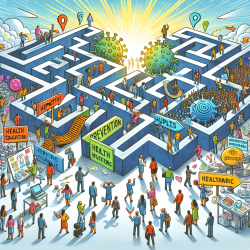The Maternal Health Learning and Innovation Center (MHLIC) is setting a new standard for maternal health workforce development by prioritizing equity and innovation. As practitioners in the field of maternal health, it is crucial to understand the transformative impact of centering equity in our work. This blog explores key insights from the MHLIC's approach and encourages practitioners to integrate these strategies into their practice.
The Importance of Centering Equity
The United States faces a unique challenge as the only advanced economy where maternal mortality rates are on the rise. Systemic racism contributes significantly to disparities in maternal outcomes, with Black women facing higher risks even after adjusting for various demographic factors. The MHLIC recognizes that addressing these inequities requires a comprehensive approach that includes both clinical and non-clinical workforce development.
The MHLIC's mission is to foster collaboration among diverse stakeholders to accelerate evidence-informed interventions that advance equitable maternal health outcomes. By centering equity in all efforts, the MHLIC aims to build workforce capacity through partnerships, training, technical assistance, coaching, peer learning facilitation, and a national resource repository.
Key Strategies for Practitioners
- Inclusive Partnerships: The MHLIC emphasizes the importance of dedicated partnerships to make a broad range of expertise available to the maternal health field. Practitioners should seek collaborations with organizations that have expertise in addressing inequities and providing training and technical assistance.
- Training and Technical Assistance: The MHLIC offers robust training programs that are equity-oriented, responsive, timely, and engaging. Practitioners can benefit from online learning resources, national symposia, and targeted subject matter training opportunities.
- Peer Learning Opportunities: Building a community of peer learners enhances the effectiveness of implementation activities. Practitioners should engage in peer-to-peer support networks to move from learning to action effectively.
- Resource Dissemination: The MHLIC provides access to a comprehensive online resource repository that includes trainings, recorded webinars, and other learning resources. Practitioners should utilize these resources to enhance their skills and knowledge.
The Role of Telehealth and Data Use
The COVID-19 pandemic has highlighted the importance of telehealth as a tool for delivering maternal health services. However, gaps remain in telehealth implementation, particularly for rural populations. The MHLIC identifies telehealth as a primary knowledge gap that needs addressing. Practitioners should focus on improving telehealth strategies to expand access to care.
Additionally, effective data use and dissemination are crucial for advancing maternal health outcomes. Practitioners should prioritize access to disaggregated data and use it to inform decision-making processes.
A Call to Action for Practitioners
The MHLIC's approach underscores the need for continuous learning and adaptation in the field of maternal health. Practitioners are encouraged to engage with the MHLIC's resources and participate in ongoing training and technical assistance opportunities.
The commitment to equity must be woven into every aspect of maternal health practice. By centering equity in our work, we can improve outcomes for all mothers and children while addressing systemic disparities.










